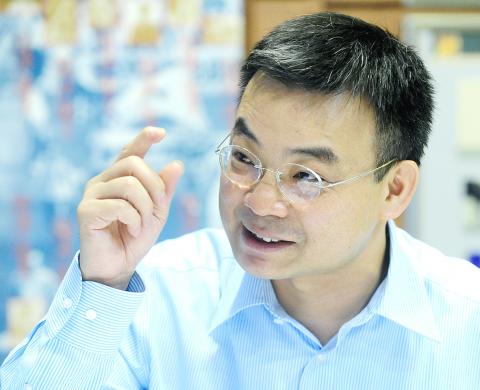Economist Honigmann Hong (洪財隆) was appointed director of the Democratic Progressive Party’s (DPP) Department of China Affairs as DPP Chairman Su Tseng-chang (蘇貞昌) filled the last three remaining spots of department heads.
Hong, an assistant economics professor at National Tsing Hua University, will take over the Department of China Affairs, which was reinstated on July 25 after being merged with the Department of International Affairs for five years, DPP spokesperson Lin Chun-hsien (林俊憲) told a press conference.
Su, who finally completed his political team roster after assuming the party’s leadership in May, picked Hong, 46, for his expertise in regional economics, a key issue in cross-strait relations, Lin said.

Photo: George Tsorng, Taipei Times
The reinstatement of the department and a plan to establish a China Affairs Committee as a policy-making platform have been seen as attempts to improve the DPP’s ties with Beijing.
The establishment of the much-discussed committee, which is expected to oversee the DPP’s China policy, is still in the works. Former premier Frank Hsieh (謝長廷) was reportedly interested in leading it.
Additionally, Chang Chi-chang (張基長), a Su confidant, was named director of the Department of Youth Development, while Ho Po-wen (何博文), a journalist-turned-political commentator, was tapped as director of the Democracy Institute, Lin said.
In related news, Su convened a meeting to discuss the party’s position and strategy on a proposed cross-strait investment protection agreement, which could be finalized in an eighth round of cross-strait negotiations on Thursday.
The meeting, which gathered party officials and more than a dozen legislators to seek a unified position on the issue, concluded with four demands to President Ma Ying-jeou’s (馬英九) administration.
First, the DPP insisted that the agreement must protect the personal safety and basic human rights of Taiwanese businesspeople in China, Lin said, adding that China should notify Taiwan within 24 hours of all cases of Taiwanese being detained and allow detained Taiwanese to hire lawyers.
Second, he said, regulations on Chinese investment in Taiwan should be written into law and government agencies should be established to monitor the investments.
Third, Lin said, cross-strait negotiation should be transparent and monitored by the Legislative Yuan because the opaque negotiation process in the past four years was the primary reason the academics and the legislature were concerned about the bilateral talks.
Last, the DPP urged the government to conduct thorough reviews on the implementation of the 16 agreements signed in the past before moving forward, Lin said.
The implementation of those agreements was questionable because Hon Hai Group chairman Terry Gou (郭台銘) was still complaining about infringement of intellectual property rights (IPR) in China two years after Taiwan and China signed the IPR agreement, Lin said.
Meanwhile, China remains a haven for Taiwanese criminals, despite the Joint Fight against Crime and Mutual Legal Assistance Agreement having gone into effect in June 2009, Lin said.
The DPP has no plans to organize any form of protest against the cross-strait talks, Lin said, but it would not bar its party members from taking part in protests.

Taiwanese can file complaints with the Tourism Administration to report travel agencies if their activities caused termination of a person’s citizenship, Mainland Affairs Council Minister Chiu Chui-cheng (邱垂正) said yesterday, after a podcaster highlighted a case in which a person’s citizenship was canceled for receiving a single-use Chinese passport to enter Russia. The council is aware of incidents in which people who signed up through Chinese travel agencies for tours of Russia were told they could obtain Russian visas and fast-track border clearance, Chiu told reporters on the sidelines of an event in Taipei. However, the travel agencies actually applied

Japanese footwear brand Onitsuka Tiger today issued a public apology and said it has suspended an employee amid allegations that the staff member discriminated against a Vietnamese customer at its Taipei 101 store. Posting on the social media platform Threads yesterday, a user said that an employee at the store said that “those shoes are very expensive” when her friend, who is a migrant worker from Vietnam, asked for assistance. The employee then ignored her until she asked again, to which she replied: "We don't have a size 37." The post had amassed nearly 26,000 likes and 916 comments as of this

New measures aimed at making Taiwan more attractive to foreign professionals came into effect this month, the National Development Council said yesterday. Among the changes, international students at Taiwanese universities would be able to work in Taiwan without a work permit in the two years after they graduate, explainer materials provided by the council said. In addition, foreign nationals who graduated from one of the world’s top 200 universities within the past five years can also apply for a two-year open work permit. Previously, those graduates would have needed to apply for a work permit using point-based criteria or have a Taiwanese company

The Shilin District Prosecutors’ Office yesterday indicted two Taiwanese and issued a wanted notice for Pete Liu (劉作虎), founder of Shenzhen-based smartphone manufacturer OnePlus Technology Co (萬普拉斯科技), for allegedly contravening the Act Governing Relations Between the People of the Taiwan Area and the Mainland Area (臺灣地區與大陸地區人民關係條例) by poaching 70 engineers in Taiwan. Liu allegedly traveled to Taiwan at the end of 2014 and met with a Taiwanese man surnamed Lin (林) to discuss establishing a mobile software research and development (R&D) team in Taiwan, prosecutors said. Without approval from the government, Lin, following Liu’s instructions, recruited more than 70 software